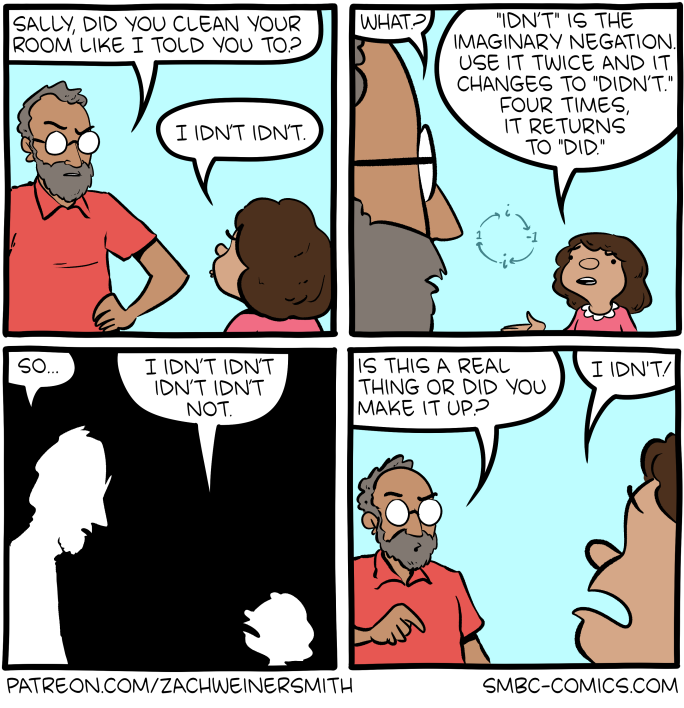Idn't idn't really do it
« previous post | next post »
The mouseover title: "Sorry"
The AfterComic:

For background, see "Getting real", 1/20/2011.
August 19, 2025 @ 11:15 am · Filed by Mark Liberman under Linguistics in the comics
« previous post | next post »
The mouseover title: "Sorry"
The AfterComic:

For background, see "Getting real", 1/20/2011.
August 19, 2025 @ 11:15 am · Filed by Mark Liberman under Linguistics in the comics
Powered By WordPress

Vulcan with a Mullet said,
August 19, 2025 @ 8:42 pm
The most confusing thing about this comic is that the number grid is reversed from normal positive=right orientation lol
AntC said,
August 19, 2025 @ 10:35 pm
This makes at least as much sense as Euler's equivalence using i as an exponential.
Viseguy said,
August 23, 2025 @ 1:21 pm
I guess the key is in the circular diagram in panel two, which shows that, as Google AI puts it, "the imaginary unit i has a cyclical property: i¹ = i, i² = -1, i³ = -i, and i⁴ = 1, with each subsequent power of i following this pattern", so that — for purposes of the comic — each successive even power of i is alternately -1 and 1. It follow that the kid admits that she hasn't cleaned her room, while cunningly diverting attention from that fact. That's how I read it, anyway.
Philip Taylor said,
August 24, 2025 @ 4:18 am
I hadn’t even the $i$-circle. Thank you, Viseguy, for drawing my/our attention to it.
Philip Taylor said,
August 24, 2025 @ 4:19 am
Sorry, a stressed (italicised) "noticed" somehow disappeared from the previous comment. Please mentally insert one before the $-$-circle.
Nat J said,
August 24, 2025 @ 2:41 pm
Oh, I think the last panel is very funny!
Yes, I agree with Viseguy’s reading, only adding that the last panel Is neither negation nor assertion, but rather nonsense. And that’s where, for me, it becomes quite funny. The first three panels are essentially s logical exercise. Once you learn the system, you can translate the daughter’s words into good English. It’s awkward and pointless, but intelligible. Until you come to the last panel, which points out that the system isn’t entirely sensible.It’s a clash of surreal absurdism and intellectual rigor. It’s got that twisty surprise which is characteristic of much great humor. The joke leads you in one direction, and then flips your expectations at the last moment. Ok, I’m probably overselling it a bit, it’s a minor joke, but I do think it’s funny.
At the risk of running the joke even more into the ground, I was thinking, if you can have fuzzy-valued or tri-valued logics, maybe you could have a complex valued logical proposition. Something evaluation that attaches to propositions and is orthogonal to truth or falsity. Persuasiveness? Rhetorical force? A statement that’s both true and persuasive would have a value of 1+i. True but never believed by anyone would be 1-i. Or maybe there’s a better dimension to use? Truth vs humorousness. Truth vs beauty. True and beautiful or true and ugly
Viseguy said,
August 25, 2025 @ 9:24 pm
@Nat J:
I'm not so sure. If the circular diagram is named Rosetta, idn't is arguably an "imaginary" did not, such that if notionally multiplied by itself, yields a "real" did. I would argue that "imaginary", in this context, does not equate to "nonsensical", any more than "imaginary" numbers are less real (no quotes) than "real" numbers. To put it another way, in the imaginary (no quotes) world of the comic, what may be nonsensical to the father is totally *sensical</em to the daughter. Otherwise, I submit, the world would stop turning.
Viseguy said,
August 25, 2025 @ 9:26 pm
… is totally *sensical to the daughter. Otherwise, …
Nat j said,
August 26, 2025 @ 2:28 am
You think that in the world of the comic, the daughter does have an interpretation for “idn’t”? Could be… could be.
I still think the humorous effect comes from the reader being given the impossible task of trying to make sense of it. Though, as I suggested above, I’m open to the impossibility only being temporary. I’m more than happy to try come up with a way to make sense of it!